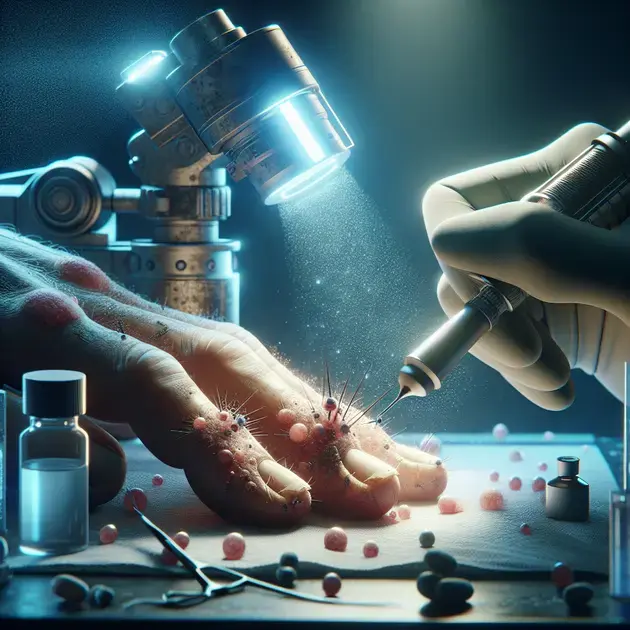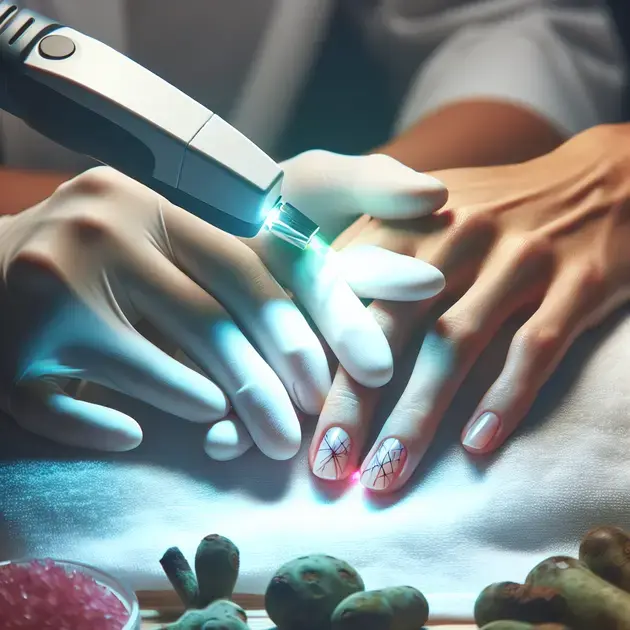When it comes to dealing with nail fungus, finding effective solutions is crucial for restoring healthy nails. From over-the-counter treatments to natural remedies, there are various options available for treating fungus in nails. However, it’s essential to understand the underlying causes of the infection to choose the most suitable treatment.
Recent studies have shown promising results with innovative treatments such as laser therapy and photodynamic therapy for eliminating fungus in nails. These advanced solutions offer effective outcomes with minimal side effects, providing new hope for individuals struggling with persistent nail fungus. By exploring these cutting-edge options, it’s possible to achieve clear and healthy nails once again.

Effective Solutions for Nail Fungus Treatment
Nail fungus can be a frustrating and persistent issue for many individuals. However, there are effective solutions available to help treat this condition. One popular and proven method is using antifungal medications, either in oral or topical form. These medications work by targeting the fungus directly and stopping its growth.
Another effective solution is laser therapy, which has gained popularity in recent years. This treatment involves using a laser to target and destroy the fungus without causing damage to the surrounding skin and tissue. Many dermatologists and podiatrists offer laser therapy as a treatment option.
Home remedies such as tea tree oil, vinegar, and coconut oil have also shown promise in treating nail fungus. These natural remedies have antifungal properties that can help combat the infection. Regularly applying these remedies to the affected nails can improve the condition over time.
Preventative measures are also key in treating nail fungus. Keeping the feet clean and dry, wearing breathable shoes and socks, and avoiding walking barefoot in public places can help prevent the spread of fungus. It’s essential to maintain good foot hygiene to reduce the risk of reinfection.
Consulting with a healthcare professional is crucial to determine the most suitable treatment for your specific case of nail fungus. Whether opting for medication, laser therapy, home remedies, or a combination of treatments, following a consistent treatment plan is vital for effectively addressing nail fungus.
Understanding the Root Causes of Nail Fungus
Nail fungus, also known as onychomycosis, is a common condition caused by various fungal species. Understanding the root causes of nail fungus is essential in effectively treating and preventing the infection. One of the primary causes is a warm and moist environment, which creates an ideal breeding ground for fungi to thrive.
Other risk factors for nail fungus include wearing tight-fitting shoes, having a weakened immune system, and sustaining nail injuries. Individuals who frequent public pools, gyms, and showers are also at a higher risk of developing nail fungus due to exposure to fungal spores in these environments.
Poor foot hygiene and excessive sweating can contribute to the development of nail fungus. Fungi feed on keratin, a protein found in nails, hair, and skin, leading to nail infections when not properly managed. Understanding these root causes can help individuals modify their habits and environment to reduce the risk of nail fungus.
Regularly trimming nails, wearing breathable footwear, and practicing good foot hygiene are crucial in preventing nail fungus. Avoiding sharing nail clippers and other personal items with infected individuals can also help reduce the spread of fungus. By addressing the root causes of nail fungus, individuals can take proactive steps towards maintaining healthy nails.
If nail fungus persists despite preventive measures, seeking medical attention from a dermatologist or podiatrist is recommended. These healthcare professionals can provide a comprehensive diagnosis and recommend tailored treatment options based on the underlying causes of the infection.
Exploring Advanced Treatments for Fungal Nail Infections
For individuals seeking advanced treatments for fungal nail infections, several innovative options are available to address this stubborn condition. One of the cutting-edge treatments is photodynamic therapy, which involves the use of light-activated medication to target and eliminate the fungus.
Cryotherapy, or freezing therapy, is another advanced treatment that has shown promising results in treating fungal nail infections. This procedure involves applying freezing temperatures to the affected nails, effectively killing the fungus. Cryotherapy is typically performed by healthcare professionals in a clinical setting.
In some cases, surgical intervention may be necessary for severe fungal nail infections that do not respond to conservative treatments. Surgical procedures such as nail removal or debridement can help eliminate the infected nail tissue and promote the growth of a healthy nail.
Emerging technologies such as laser therapy and microcurrent therapy are also being explored as advanced treatment options for fungal nail infections. These non-invasive treatments target the fungus while preserving the integrity of the nail and surrounding tissue.
Before undergoing any advanced treatment for fungal nail infections, it’s essential to consult with a healthcare provider to discuss the benefits, risks, and expected outcomes. By exploring these advanced treatment options, individuals can find effective solutions for stubborn fungal nail infections and achieve healthier nails.

Natural Remedies for Nail Fungus Treatment
When dealing with nail fungus, many individuals turn to natural remedies as a complementary approach to traditional treatments. One of the most popular options is tea tree oil, known for its antifungal properties. Applying tea tree oil directly to the affected nails can help inhibit the growth of fungi. Another natural remedy is coconut oil, which has moisturizing properties that can support the healing process of the nails.
Vinegar is also a common household item that can be used to treat nail fungus. Its acidic nature creates an environment that is unfriendly to fungi, making it a popular choice for soaking the affected nails. Additionally, essential oils like lavender or peppermint oil are believed to have antifungal properties that can aid in the treatment of nail fungus.
For a more holistic approach, some individuals opt for probiotics to help balance the gut microbiome, as imbalances in gut health can sometimes contribute to fungal infections. Additionally, maintaining proper hygiene, such as keeping nails clean and dry, is crucial when using natural remedies for nail fungus treatment.
Lastly, a healthy diet rich in nutrients like vitamins A, C, and E, as well as zinc and biotin, can support overall nail health and enhance the effectiveness of natural remedies in treating nail fungus.
Prevention Tips for Fungal Nail Infections
Preventing fungal nail infections is key to maintaining healthy nails. One of the most important prevention tips is to practice good foot hygiene. This includes regularly washing and drying the feet thoroughly, especially between the toes. Avoiding walking barefoot in public places like swimming pools or locker rooms can also help reduce the risk of fungal infections.
Wearing clean socks made of breathable materials like cotton and changing them daily can prevent the accumulation of moisture that fungi thrive in. Additionally, wearing properly fitted shoes that allow for air circulation can help keep the feet dry and healthy. Trimming nails straight across and avoiding tight-fitting shoes can also reduce the likelihood of nail trauma that can lead to fungal infections.
Furthermore, it is important to protect the nails from excess moisture by using antifungal powders or sprays, especially in humid environments. Regularly disinfecting nail clippers and avoiding sharing them with others can also prevent the spread of fungal infections. Lastly, maintaining a healthy immune system through a balanced diet, regular exercise, and sufficient sleep can support the body’s natural defense mechanisms against fungal nail infections.
Medical Diagnosis for Nail Fungus Issues
When dealing with nail fungus problems, seeking medical diagnosis is essential for proper treatment. A healthcare provider may perform a physical examination of the affected nails and possibly take nail clippings or scrapings for further analysis. These samples can be examined under a microscope or sent to a laboratory for fungal culture to determine the specific type of fungus causing the infection.
In some cases, a healthcare provider may recommend a Wood’s lamp examination, which uses ultraviolet light to detect certain types of fungi on the nails. Blood tests may also be conducted to rule out underlying conditions that may be contributing to the nail fungus. Based on the diagnosis, a healthcare provider can recommend appropriate treatment options, which may include topical or oral antifungal medications.
If the nail fungus is severe or recurring, a healthcare provider may suggest laser therapy or surgical nail removal as alternative treatment options. It is important to follow the healthcare provider’s instructions closely and attend follow-up appointments to monitor the progress of the treatment. Early diagnosis and intervention can help prevent the spread of nail fungus and promote faster healing of the nails.
Conclusion
In conclusion, natural remedies offer a promising alternative for individuals seeking treatment for nail fungus. Options like tea tree oil, coconut oil, vinegar, and essential oils provide effective antifungal properties that can inhibit the growth of fungi and support the healing process of the nails. Incorporating probiotics and maintaining proper hygiene, along with a nutrient-rich diet, can further enhance the effectiveness of these natural remedies in addressing nail fungus.
Furthermore, preventing fungal nail infections is crucial for maintaining optimal nail health. Practicing good foot hygiene, wearing breathable socks and properly fitted shoes, and protecting nails from excess moisture are essential preventive measures. Regularly disinfecting nail tools and maintaining a healthy immune system through balanced nutrition and lifestyle habits can significantly reduce the risk of fungal infections and promote overall nail health.
Seeking medical diagnosis when experiencing nail fungus problems is paramount to receiving appropriate treatment. Healthcare providers can conduct thorough examinations, recommend suitable treatment options, and monitor the progress of the healing process. Early intervention, whether through topical or oral medications, laser therapy, or surgical procedures, can prevent the spread of nail fungus and facilitate quicker recovery, ultimately ensuring the well-being of the nails.